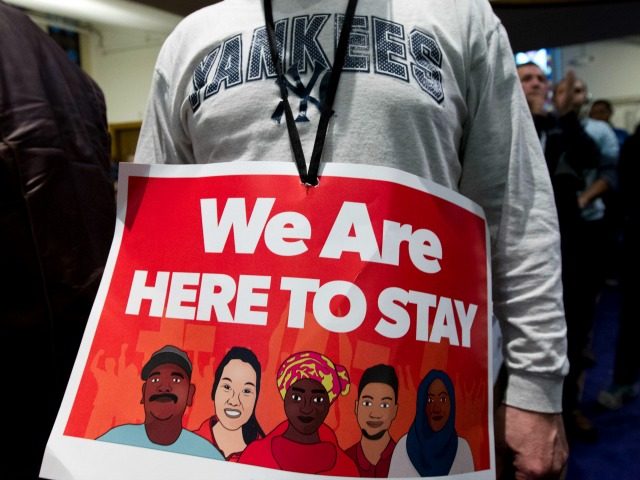Acting Secretary of Homeland Security Elaine Duke refused to allow “Temporary Protected Status” (TPS) to expire Monday for two Central American countries after almost two decades of continual extensions. Instead, administration officials are asking Congress to consider a de facto amnesty for nearly 100,000 Nicaraguans and Hondurans.
“Only Congress can legislate a permanent solution and provide those in an otherwise perpetually temporary status with a certain future,” a senior administration official told reporters as he announced that TPS would be wound down over a course of 15 months for Nicaragua and no definite action would be taken on Honduras.
Perhaps most discomforting for immigration hawks, the determinations appear to indicate a significant acceptance of the logic of an internal DHS memo leaked to Breitbart News, arguing TPS must be extended because those protected by it have been in the United States so long, effectively converting the ostensibly temporary program into another large-scale amnesty.
TPS was originally granted to Nicaraguans and Hondurans in the United States in early 1999 because Hurricane Mitch had made those countries temporarily unsafe to deport people to. The supposedly “temporary” program was extended continually, with little debate, under the Bush and Obama administrations.
Monday, Secretary Duke determined that Nicaragua was no longer unsafe from the after-effects of a hurricane that struck nearly 19 years ago and, therefore, was ineligible for TPS. Instead of ending the TPS safe harbor for an estimated 5,300 Nicaraguans when the last extension expires in January, Duke and the administration decided to extend the program by an additional year.
Senior administration officials characterized this move as “terminating” TPS for Nicaragua and encouraged those 5,300 to prepare for a return to their home country despite the fact they will be legally protected at least until January 2019.
For the estimated 86,000 Hondurans whom TPS shielded from deportation, Duke instituted an “automatic” six-month extension to June of next year based on her inability to determine if Honduras is now safe from 1999’s hurricane. The State Department separately concluded on Friday that protected status is no longer justified for Central America.
Administration officials left open the possibility Honduras would be removed from the TPS list “with an appropriate delay” if it were later determined conditions in the country were satisfactory. “The acting secretary and the administration are committed to working with Congress to address the issue of Nicaraguan TPS termination,” alluding, as with the up-to-three-million so-called “Dreamers,” to a deal to provide permanent legal status for TPS recipients through a legislative fix.
In response to a question posed by Breitbart News’s Neil Munro, administration officials fell back on the exact logic that James D. Nealon, an assistant secretary in DHS’s Office of Strategy, Policy, and Plans, used in his private memo reported on Sunday. Nealon, using criteria legally impermissible to justify TPS extensions under the Immigration and Nationality Act of 1990, which created the program, argued for an 18-month extension for Nicaragua, Honduras, and El Salvador, whose status is not yet up for extension.
“[I]t makes no sense to send [citizens of Honduras, Nicaragua, and El Salvador] back to their country of origin,” Nealon wrote in the memo addressed to Acting Secretary Duke because after nearly 20 years in America, they “work legally in great numbers,” are “liv[ing] the American dream,” and “have many thousands of American citizen children.”
Neither having been in the United States for a long time nor having occupied an American job is related to TPS’s stated purpose of preventing deportations to dangerous places or are criteria for making that determination of danger.
In Monday’s announcement, however, the administration did not distance itself from Nealon’s logic, which, taken to its conclusion, would convert TPS into a de facto amnesty. It, in fact, appeared to call on Congress to do so. “The administration understands that there are a number of individuals who have been in a TPS status … potentially for 20 years,” said a senior administration official. “[G]iven … the lengthy period of their presence here … Congress may wish to provide a solution that allows them a more permanent status.”
Current White House Chief of Staff Gen. John Kelly personally appointed Nealon when he was Secretary of Homeland Security. The two men served together in the leadership of the U.S. Southern Command, Kelly as military commander and Nealon as civilian deputy.
The Nealon Memo and Monday’s announcements regarding Nicaragua and Honduras are the latest signals that the administration is willing to tolerate a permanent presence in the United States for TPS recipients.
After announcing what was touted as the final TPS extension for Haitians in May, Kelly defended that move, even as Haitians flooded Canada’s border seeking to avoid returning to their homeland. Even then, he told the Miami Herald in June, “I think the members of Congress who are interested in this, and there are a lot of them, should probably sit down and talk about it and come up with some legislation to fix it. I think it’s on them.”
The suggestion of a TPS amnesty may be, as with the earlier administration strategy on ending Deferred Action for Childhood Arrivals (DACA), a mechanism by which to gain leverage for a grand congressional bargain on immigration. Holding in abeyance a permanent legal status or even a path to citizenship for the approximately 300,000 TPS recipients could, along with amnesty for more than 800,000 DACA amnesty, be used to extract concessions from Democrats and open-borders Republicans on the southern border wall, the RAISE Act, and ending chain migration.
Officials made no further announcement regarding El Salvador or Haiti on Monday. TPS has shielded tens of thousands from each country for years past the original natural disasters that prompted the status’s extension to them.

COMMENTS
Please let us know if you're having issues with commenting.